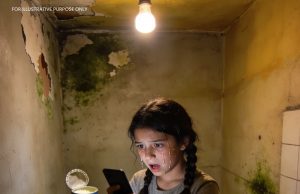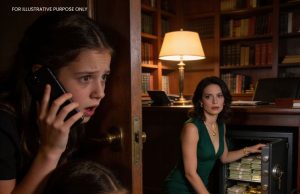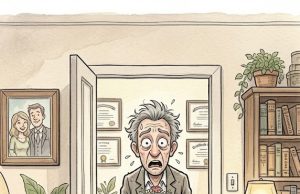The morning after my father’s funeral, I stood on the porch of his house, staring at my belongings piled carelessly in the cold. A suitcase gaped open, shirts spilling onto the wooden boards like discarded memories. My stepmother, Carol, stood in the doorway, her arms crossed tightly, her voice sharp enough to cut glass.
“This house is for family,” she hissed, her lips curling in disdain. Then she slammed the door, the echo reverberating through my chest.

“This house is for family,” she hissed, her lips curling in disdain. Then she slammed the door, the echo reverberating through my chest.
Family. The word stung. For five years, after my parents’ divorce and my father’s remarriage, I had tried to find my place here. But now, with my father gone, Carol made it brutally clear: I was nothing.
I stood frozen for a moment, clutching the handle of my duffel bag, my heart pounding. Neighbors’ curtains twitched, silent witnesses to my humiliation. I wanted to shout, to pound on the door, to demand that she let me back inside the only home I had left. But grief had hollowed me out, and the slam of that door felt final.
Homeless. Heartbroken. Alone.
The only person I could turn to was my mother, Linda, who lived three hours away in rural Pennsylvania. She and my father had been divorced for over a decade, and they hadn’t spoken in years. I dreaded the call, ashamed of how small and broken I sounded, but she didn’t hesitate. “Stay where you are,” she said firmly. “I’m coming.”
She drove through the night. By dawn, I was still sitting on the porch steps, numb with exhaustion, when her headlights swept across the yard. She emerged from the car, her face pale with worry but her arms strong as they wrapped around me. For the first time since the funeral, I let myself cry.
When she pulled back, she glanced at the darkened house behind me. Her jaw tightened, and something unreadable passed through her eyes—cold, determined.
“Sweetheart,” she whispered, brushing a tear from my cheek, “your father and I had a secret. And it’s something Carol is not going to like.”
Her words sliced through my grief like a spark in dry tinder. A secret? My father, who had always seemed so straightforward, had hidden something from me? And my mother—why reveal it now, of all times?
The house loomed behind us, its windows dark, but suddenly it didn’t feel like home anymore. It felt like the beginning of a battle.
The ride back to my mother’s house was mostly silent. The early morning sun stretched across the highway, painting the world in pale gold, but inside the car, the weight of her words pressed down heavier than grief itself. I wanted to ask, to demand she explain, but every time I opened my mouth, I caught the sharp focus in her eyes and swallowed my questions.
It wasn’t until we sat at her small kitchen table, steaming mugs of coffee between us, that she finally spoke.
“Your father and I… we never finalized the divorce.”
I blinked at her. “What?”
She nodded slowly, her hands clasped tightly together. “We filed the papers. We separated. We lived apart. But the divorce was never legally completed. For all these years, on record, I was still his wife.”
I stared at her, trying to process. “So… that means…?”
“It means,” she said firmly, “Carol has no legal claim to that house. Or to his estate. Everything—everything—is supposed to pass to me. And to you.”
The words rocked me. My stepmother’s sneer, the slam of the door, the way she tossed my life onto the porch—all of it burned hotter with each second. She had called me an outsider, but by law, she was the one who didn’t belong.
“But why didn’t you ever tell me?” I whispered.
My mother looked down at her mug. “Because I didn’t want you caught in the bitterness between us. And because your father begged me not to. He said he wanted peace for you. But now…” She exhaled, her voice trembling for the first time. “Now, I think he’d want me to protect you.”
I sat back in my chair, my mind racing. The house. My father’s savings. The little pieces of him left behind—they weren’t Carol’s to claim. They were ours.
But there was a problem. Carol wasn’t going to let go easily.
The next week was a blur of paperwork. My mother dug out old files, marriage certificates, the incomplete divorce petition. She called an attorney, who confirmed what she already knew: legally, she was still the surviving spouse.
The fight was just beginning.
One afternoon, as we drove back to town to meet with the lawyer, I saw Carol in the distance, standing on the porch that used to be mine. She was smoking a cigarette, glaring at us like she already knew what we were about to do. For the first time in days, I felt something stronger than grief rising in my chest.
It was resolve.
Courtrooms don’t smell like justice. They smell like paper, dust, and nervous sweat. That’s what I realized weeks later as I sat beside my mother at a long oak table, facing Carol across the aisle. She looked polished, her blond hair pinned neatly, her lawyer whispering in her ear. When her eyes met mine, they flashed with the same venom she’d shown the day she threw me out.
But this time, I wasn’t alone.
Our attorney presented the evidence first: the marriage certificate, the divorce petition that had never been signed, tax returns still filed jointly years after my parents separated. Piece by piece, the truth unfolded. My mother was still legally married to my father until the day he died.
Carol’s face hardened. Her lawyer countered, arguing that she had lived with my father, cared for him, been his partner in every sense. She deserved the house, she insisted. She deserved everything.
I clenched my fists under the table, my heart pounding as the arguments volleyed back and forth. Memories of my father flooded me—the way he taught me to ride a bike, his laugh when he burned pancakes, the quiet pride in his eyes when I got into college. Would he have wanted this fight?
When the judge finally spoke, the room fell silent. His voice was calm, steady, but each word landed like a gavel. By law, he ruled, my mother was the surviving spouse. The estate was hers to manage. The house, the accounts, the belongings—they did not belong to Carol.
The sound of the gavel striking the block was like thunder.
Carol’s face crumpled, fury and disbelief twisting her features. For a moment, I almost pitied her. Almost. But then I remembered the sting of her words, the slam of the door, the cold night on the porch.
Outside the courthouse, the air felt lighter. My mother turned to me, her eyes tired but filled with quiet triumph. “It’s over,” she said softly.
I shook my head. “No, Mom. It’s just the beginning.”
Because winning the house wasn’t just about bricks and wood. It was about reclaiming my father’s memory, about making sure his legacy didn’t end in bitterness. Over the next weeks, we moved back in, room by room. The place smelled of dust and Carol’s perfume, but slowly, with every photograph rehung, every drawer cleared, it felt like ours again.
One evening, I sat on the porch—the same steps where I’d once sat with nowhere to go. The sun dipped low, painting the yard in orange light. My mother joined me, two cups of tea in her hands.
“For family,” she said quietly, handing me a cup.
This time, the word didn’t sting. It healed.




















